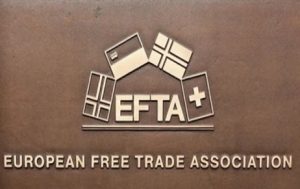Intellectual Property Rights (IPR) are like different keys for different locks. Just like every lock…
Balancing Innovation: India’s Views for Pharmaceuticals in the Efta Trade Deal
INTRODUCTION
The World Trade Organization (WTO) since its establishment has ratified more than 300 regional and bilateral Free-Trade Agreements (FTA).[i] Recently, the trend of increasing prevalence of TRIPS-Plus provisions within these trade agreements introduces stricter intellectual property (IP) regimes. This empowers countries with superior negotiating powers a leverage,[ii] typically developed nations in the context of developed-developing country partnerships.[iii] Understanding the intricacies of the negotiations thus, becomes even more critical when we consider the actualities of the pharmaceutical industry. Here, developing a new medicine requires substantial investment which comes with a high degree of uncertainty.[iv] The outcome of these negotiations therefore can significantly impact the return on investment (ROI) for pharmaceutical companies, potentially influencing their willingness to invest in future drug development. The implementation of TRIPS-Plus provisions can also readily facilitate the emergence of monopoly power for brand-name pharmaceutical companies.[v] This, in turn, can lead to significant price hikes for essential medicines.
The inclusion of TRIPS-plus provisions within trade agreements presents a potential challenge to global access to essential medicines. These provisions extend beyond the minimum IP standards, and can introduce stricter patentability criteria, extended patent terms, and more rigorous enforcement mechanisms. Studies have established a correlation between TRIPS-plus provisions and increased drug prices in importing nations. This price inflation can significantly hinder affordability and ultimately restrict access to life-saving medications.[vi] This is where governments use ‘compulsory licensing’ to ensure access to affordable drugs in public health emergencies and foster innovation, where patents and monopolies gained through it has prevailed.
INDIA AND EFTA: PHARMA FRONT
From the perspective of India, a leading producer of generic medicines, contractual agreements with developed nations raise several key considerations. The nature of the pharmaceutical industry, where it is costly to discover new drugs but relatively inexpensive to produce generic versions, leads to a constant struggle between inventors and generic drug companies.[vii] Hence, the potential FTA between India and the European Free Trade Association (EFTA)[viii] becomes a point of discussion too from the national front. The India- EFTA agreement involves negotiations between India and EFTA member countries, which include Iceland, Liechtenstein, Norway, and Switzerland. With India being a major producer of generic drugs, stricter IP rules advocated by EFTA countries could pose a challenge. The negotiations being in picture since 2008, the question of investment in pharmaceuticals have prominently existed. Branded drugs are typically controlled by one manufacturer with exclusivity, while the generic industry operates with multiple competitors, resulting in a decline in generic drug prices since 2008 while branded drug prices continue to rise.[ix] Generic manufacturers, like those of India, invest heavily in demonstrating bioequivalence and challenging weak brand patents, competing based on cost and supply in a market where multiple bioequivalent products are available.[x] This is especially troubling as many of the world’s top biotech and pharmaceutical companies are based in Switzerland and Norway, two notable EFTA members.[xi] Many of the medications and treatments that are essential to the world’s healthcare system are produced by these companies.

DATA EXCLUSIVITY IN EFTA
However, provisions like “data exclusivity” threaten to upset the balance in the pharmaceutical sector. Particularly the European Union has continuously pushed for the inclusion of data exclusivity clauses in discussions for FTAs.[xii] This clause gives the original researchers ownership of their clinical trial data for a predetermined amount of time, usually ranging for a period of six years. For the makers of generic pharmaceuticals, who have historically relied on this same data to secure regulatory clearance for their own copies of the treatments, this poses a serious obstacle.[xiii] Ensuring access to affordable medications is a key priority for India. This vital role could be significantly hampered by stricter data exclusivity provisions backed by EFTA nations. Due to this, India has firmly rejected such provisions in ongoing free trade agreement (FTA) negotiations. If implemented, data exclusivity would create hurdles for generic drug developers who traditionally rely on originator’s clinical trial data for regulatory approval. Consequently, developing nations that significantly rely on reasonably priced generic versions may find it more difficult to obtain necessary medications. The topic of data exclusivity is controversial; some current agreements include it, while others—such as India’s position—prioritize access to reasonably priced medications.
However the officials have mentioned, India has firmly rejected demands for data exclusivity provisions in trade negotiations. This move underscores the government’s commitment to supporting its robust generic drug industry. As Mr. Barthwal, Commerce Secretary, stated that Indian generic drug industry should flourish and that is one of the important objectives. He further emphasized that the industry’s contribution to exports is a significant factor, and the government will continue to protect its interests in future trade agreements.
Recognizing this potential harm, medical rights group Medicins Sans Frontières (MSF) has actively voiced its opposition. Their letter to Prime Minister Modi emphasizes the reliance on India’s robust generic industry for supplying lifesaving medications. MSF, for example, procures a significant portion of its HIV, hepatitis C, TB treatments, and vaccines from Indian manufacturers. Data exclusivity could disrupt this crucial supply chain, jeopardizing access to essential medicines for millions globally.
CONCLUSION
A heated controversy has been sparked by the possible inclusion of data exclusivity in the India-EFTA free trade agreement. Stricter intellectual property laws encourage the creation of novel medications, yet questions remain over how they may affect accessibility and affordability. This provision may cause a pricing barrier for patients in developing nations, such as India, by delaying the release of generic versions. India is dedicated to finding a careful balance, as seen by its strong position against data exclusivity. Careful bargaining tactics are required to ensure affordability while promoting innovation. The ability of the India-EFTA agreement to resolve these issues and guarantee that everyone has access to necessary medications may determine how successful it is.
Author :Ipsita Sarkar, in case of any queries please contact/write back to us via email to chhavi@khuranaandkhurana.com or at IIPRD.
[i] World Trade Organization, https://www.wto.org/english/tratop_e/region_e/region_e.htm (last visited Mar. 6, 2024).
[ii] Michael Palmedo, Evaluating the impact of Data Exclusivity on the Proce per KG of Pharmaceutical Imports, 48 WP Global Economic Policy Center 1, (2021).
[iii] Gerald Mossinghoff and Thomas Bombelles, Intellectual Property Protection and the Pharmaceutical Industry, Oblon (1996), https://www.oblon.com/publications/intellectual-property-protection-and-the-pharmaceutical-industry.
[iv] Islam, M.D., Kaplan, W.A., Trachtenberg, D. et al, Impacts of intellectual property provisions in trade treaties on access to medicine in low & middle income countries: a systematic review, 15 Global Health, 88 (2019).
[v] Id.
[vi] Henry Grabowski, Genia Long, et al, Continuing trends in US brand-name and generic drug competition, 24 Journal of Medical Economics, 908 (2021).
[vii] OECD, https://www.oecd.org/daf/competition/generic-pharmaceuticals-competition.htm (last visited Mar. 8, 2024).
[viii] EFTA, https://www.efta.int/free-trade/ongoing-negotiations-talks/india (last visited Mar. 7, 2024).
[ix] Association for Accessible Medicines, https://accessiblemeds.org/sites/default/files/2017-10/AAM-Generic-Brand-Drug-Supply-Chain-Brief.pdf (last visited Mar. 06, 2024).
[x] Id.
[xi] EFTA, https://trade.efta.int/#/country-graph/EFTA/IN/2022/HS2 (last visited Mar. 8, 2024).
[xii] Rachel Thrasher, How Data Exclusivity Laws Impact Drug Prices, Global Development Policy Center, https://www.bu.edu/gdp/2021/05/25/chart-of-the-week-how-data-exclusivity-laws-impact-drug-prices/ (last visited Mar 9, 2024).
[xiii] The India Express, https://indianexpress.com/article/business/india-reject-european-eu-fta-data-exclusivity-demand-to-protect-generic-drug-firms-9163600/ (last visited Mar. 7, 2024).



